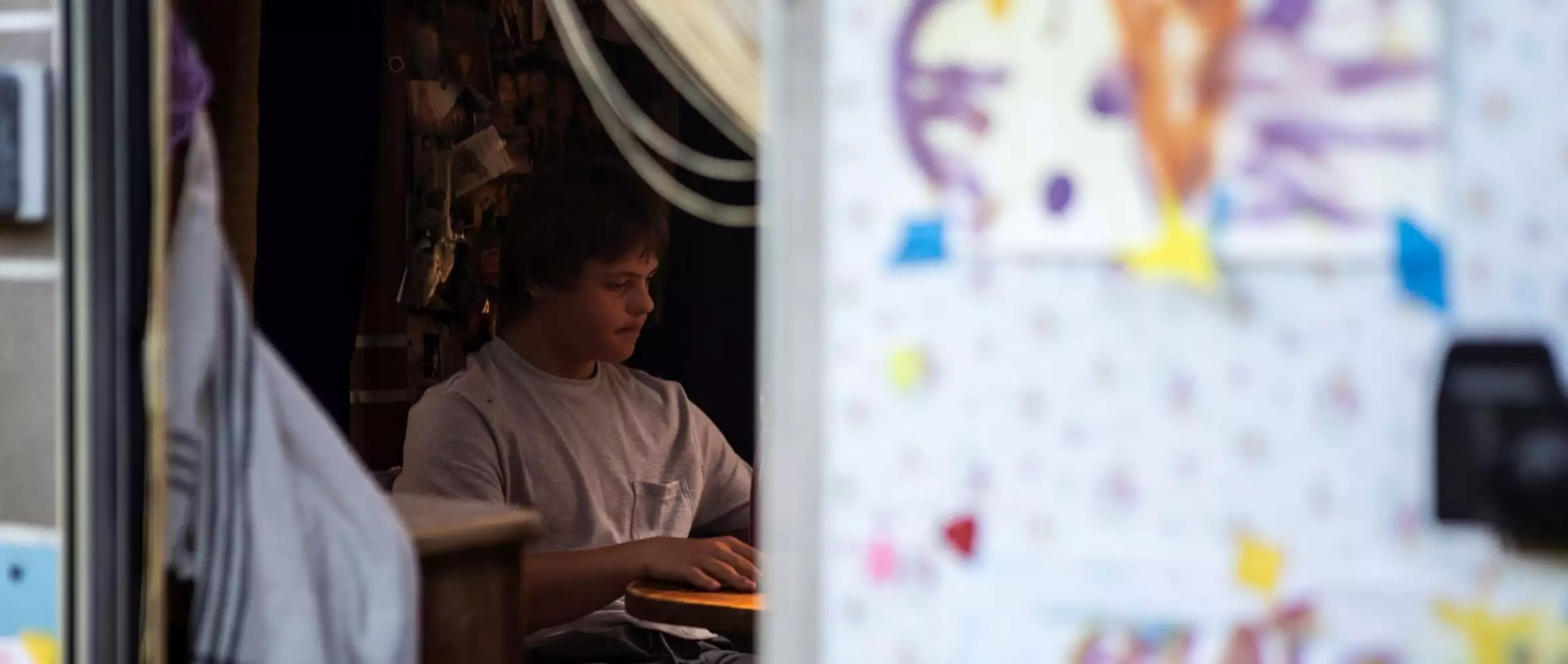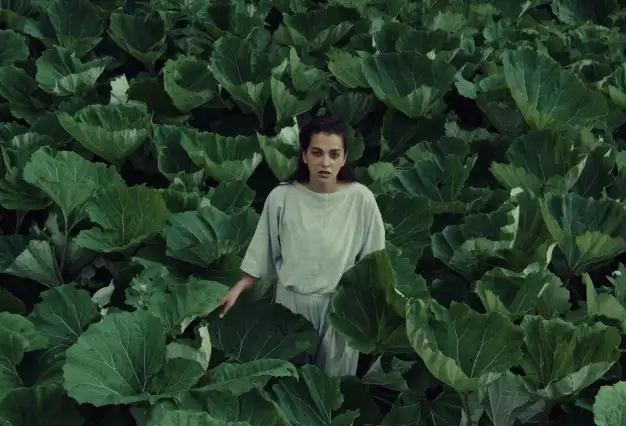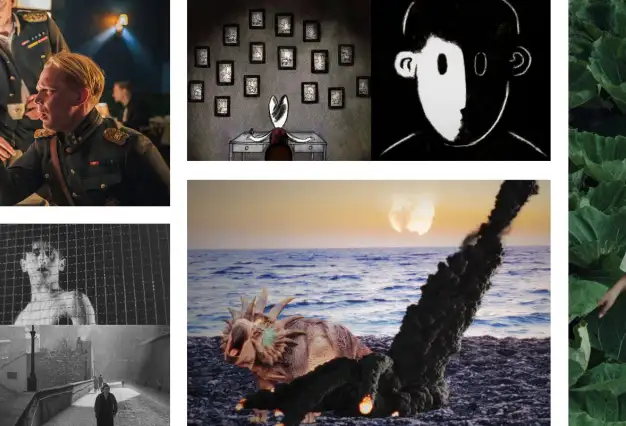
11 July 2023
Caravan: Taboos of motherhood undone
Caravan: Taboos of motherhood undone

Czech filmmaker Zuzana Kirchnerová is working on her eagerly-awaited debut feature film, Caravan, plunging into the seldom-explored narrative of a mother and her disabled son on a transformative journey. The psychological drama within a road movie devours taboos about motherhood and living with disability in order to explore paths to personal freedom for both protagonists.
Article by Martin Kudláč for CZECH FILM / Fall 2023
The recent evolution of international cinema is witnessing an invigorating surge of female filmmakers, seizing center stage and engaging with previously unexplored or repressed topics. This expanding contingent of female creators is pioneering a challenge to conventional narratives, confronting overlooked societal issues, and presenting nuanced, intricate representations of an unvarnished reality.
Joining their ranks is the rising Czech filmmaker Zuzana Kirchnerová, shooting her feature-length fiction debut, Caravan. Kirchnerová's brave and bold narrative throws a spotlight on frequently disregarded or misunderstood communities, eloquently portraying their unique struggles and victories — from socioeconomic disparities to the dissolution of cultural identities.
Disrupting social preconceptions
Zuzana Kirchnerová, an esteemed FAMU graduate, first achieved international acclaim when her student short film, Baba, won the Premier Prix de la Cinéfondation at Cannes in 2009, marking her the first (and only) Czech filmmaker to garner this honor. Before her debut in Cannes, the filmmaker already had several short films under her belt, which she not only directed but penned as well.
Kirchnerová's lauded short film, Baba, a bachelor's project, is a sober realist work revealing the hardships of family obligations. Centering on Veronika, a teen tasked with caring for her bedridden grandmother, the unflinching plot explores resentment, fear, mortality, and the unexpected onset of adulthood. This austere reality, presented through a tension-filled narrative in a claustrophobic setting with minimalist design, scrutinizes ageing, responsibility, and the early end of childhood, offering no simplistic solutions.
Post-Cannes, Kirchnerová dove into documentary filmmaking, writing and directing a Czech Television series that cast a spotlight on social issues. Her works include Four Pregnancies (2013-2018), a time-lapse docu-soap tracking four diverse women through pregnancy, offering a raw portrayal of womanhood and motherhood. In collaboration with documentarists Erika Hníková (Every Single Minute) and Tomáš Bojar (Art Talent Show), she contributed to The Magnificent Five (2018), a series examining the journey of five individuals with intellectual disabilities transitioning from institutions to independent living.
The themes explored in Four Pregnancies and The Magnificent Five form the thematic bedrock for Kirchnerová's feature debut. Caravan interweaves narratives of motherhood and life with disability, painting a vivid picture of a single mother striving to carve out her own existence alongside her day-to-day responsibilities of caring for her intellectually challenged son.
%20MasterFilm%20(3)_small.jpg)
%20MasterFilm%20(4)_small.jpg)
Road to freedom
The script for Caravan, collaboratively penned by Kirchnerová, Bojar and Kristina Májová, was meticulously refined through TorinoFilmLab's ScripLab and FeatureLab in 2018 and 2020, respectively. Garnering the 2019 Film Foundation Award for Best Unrealized Domestic Script, it catapulted Kirchnerová into prominence at the 17th L’Atelier de la Cinéfondation (2021) and secured her a spot in the Cannes line-up. Caravan made history as the first Czech-majority and female-led project chosen for L'Atelier.
The film centers on Ester, a worn-out woman in her forties, played by renowned Czech actress Aňa Geislerová (Havel, Anthropoid). After 15 years of single-handedly caring for her son David, Ester seizes a chance for respite while visiting a friend in Italy. However, an unforeseen event launches her and David on a transformative Italian road trip in an aged caravan, where Ester yearns to transcend her role as the mother of a disabled child.
Ester and David's vacation at a summer house is abruptly cut short after David struggles to adapt, compelling them to take refuge in a garden caravan, which only exacerbates Ester's feelings of isolation. She decides to escape, harboring hopes of finding work in the south, a place infused with memories from her past.
During their expedition, Ester and David cross paths with free-spirited Zuza, played by Juliána Oľhová (Filthy, Nightsiren), who embraces David's uniqueness, inspiring a newfound independence in him. As their funds are depleted, Ester starts working for Marco, managing immigrant farm workers, kindling a muted romance. Yet, as autumn approaches, tensions rise; Zuza exits, and Marco learns about David's condition, suggesting their halcyon summer is coming to an end.
While Ester and Zuza's casting was finalized early in the project, the search for the perfect actor to portray David was a year-long journey. Kirchnerová, dedicated to casting an actual person with a disability, along with the producer, saw over 120 non-professional actors with disabilities. After this painstaking process, David Vodstrčil was selected. His on-screen rapport with Aňa Geislerová surpassed all expectations, particularly in scenes demanding intimacy and physicality.
Atmospheric exploration of life unseen
Caravan thoroughly explores its characters' emotional voyage, highlighting the immense love, and accompanying burdens, of a mother for her child. It scrutinizes societal expectations that force women into the role of motherhood and dismantles the concept of perfect maternal love, presenting a complex portrayal of motherhood intertwined with womanhood and living with disabilities. Despite its social undercurrent, Caravan transcends the limits of social drama. The director infuses levity and ease into this complex and difficult subject matter, framing a narrative suffused with hope.
Kirchnerová daringly confronts societal taboos, challenging the unrealistic expectations placed on women. Central to the narrative, the mother-son relationship unfolds through their unique coming-of-(middle)age stories. Caravan builds on the themes from Kirchnerová's prize-winning short, Baba, about an individual wrestling with an unbidden circumstance. Drawing from her documentary work and personal experiences — having a son with Down syndrome and autism — Kirchnerová embeds personal but non-autobiographical elements into the film, expressing her rebellion against the defined role of a disabled child's mother. Inspired by the diary of a single mother with a disabled child, the road-movie genre embodies Ester's potent longing for life beyond her role as caregiver.
Kirchnerová's vision for Caravan is deeply inspired by the humanist, intimate storytelling of the Dardenne brothers, Andrea Arnold (American Honey), and Alice Rohrwacher (The Wonders). She aims to emulate their poignant character portrayals and nuanced presentations of nature and weather. Additionally, she draws on Mati Diop's atmospheric night scenes in Atlantics for a distinct visual and auditory contrast. Departing from a traditional documentary style, the film intends to spotlight poetic aesthetics with carefully designed compositions and natural lighting.
French cinematographer Helène Louvart's work, especially with Alice Rohrwacher, significantly influenced Caravan's visual style. Kirchnerová emphasizes the extensive research done in Italy to ensure authenticity within the scenes. The film's visual language is inspired by Gueorgui Pinkhassov's photography, which magically transforms the ordinary. The aim is to enhance the narrative through visuals that reflect protagonist David's unique sensitivity to light, shadows, and mood, while avoiding oversimplification.
%20MasterFilm%20(5)_small.jpg)
%20MasterFilm%20(6)_small.jpg)
Girls in Film
The project was launched by Czech producer Pavla Janoušková Kubečková in nutprodukce (Burning Bush), a Czech company distinguished for its variety of quality projects spanning from documentaries to TV series, closely partnered with its Slovak counterpart, nutprodukcia (Victim), led by Jakub Viktorín, who joined the project in the early stages.
The film gained international awareness through appearances at events like TorinoFilmLab, EAVE, MIA Market, and When East Meets West, fostering relationships with coproducers like Italian production company Tempesta (La Chimera, Happy as Lazzaro) and Czech Television. Caravan garnered support from several entities, including the Czech Film Fund (altogether €429,000), the Slovak Audiovisual Fund, the South Moravian Film Fund, the Italian Ministero della Cultura, and regional funds in Emilia-Romagna and Calabria.
Dagmar Sedláčková of the independent Czech outfit MasterFilm (Butterfly Vision, The Good Death), known for supporting a new generation of female film creatives and co-founding the Girls in Film platform in the Czech Republic, took over project leadership from Kubečková, leading Caravan into production.
With all department leaders being women, Caravan is a primarily female-led project, featuring cinematography by Slovakian Cinematographer of the Year 2019, Denisa Buranová (Tony, Shelly and the Magic Light, Little Harbour). Her approach, emphasizing meticulously planned scenes and natural light, aims for a poetic rather than traditional documentary aesthetic.
Zuzana Kirchnerová's feature debut is certain to draw significant attention at the upcoming Cannes Film Festival, but its impact is anticipated to extend much further, both in Czech Republic and worldwide. The film, filled with deep emotional resonance and universal appeal, is expected to be an exceptional and original work of cinema. Its profound exploration of the complexities of motherhood promises to resonate with audiences, potentially catalyzing a broader societal shift.
Caravan's shooting kicked off with 17 days in Italy's industrial Emilia-Romagna region. The second phase is set to take place in Calabria for 25 days, followed by 4 days in the Czech Republic's South Moravian Region, with challenging scenes planned. Notably, Czech editor Adam Brothánek (The Magnificent Five, Kapr Code) has already started editing footage with Kirchnerová and will continue during the second shoot, accelerating completion with a fine cut targeted by the end of 2023.
Caravan has been selected for the Venice Gap-Financing Market at the upcoming 80th edition of the Venice International Film Festival, an opportunity Sedláčková plans to use to seek additional financial push and leverage for negotiations with sales agents.





